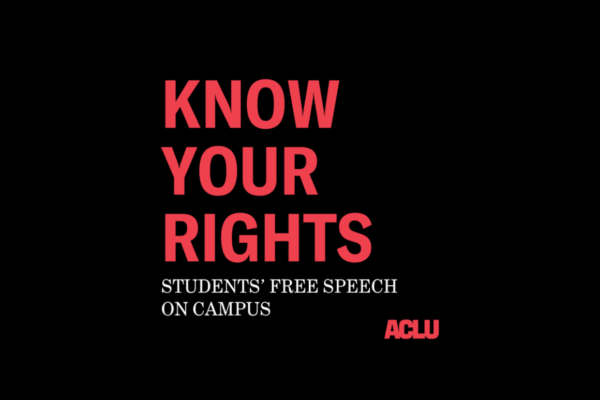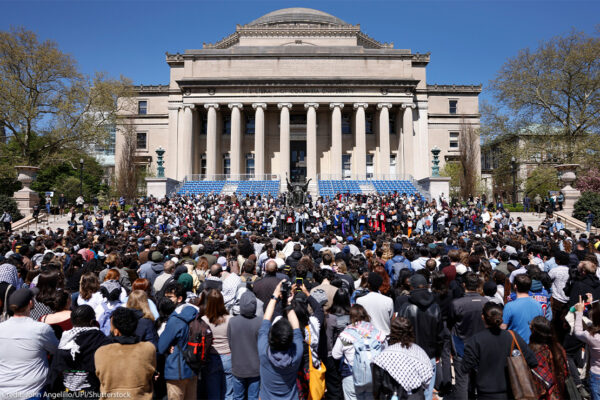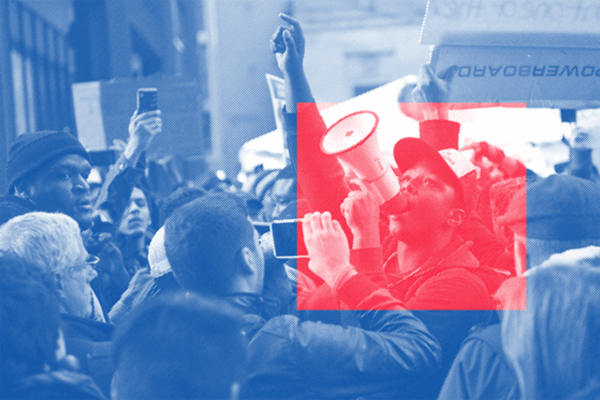The First Amendment limits what the government can do, and protects students’ right to speak out on a public university campus. Though the First Amendment does not govern what a university can do on a private campus, as a matter of principle, all institutions of higher learning should support students' free expression.
TO UNIVERSITIES
Five Basic Guardrails To Ensure Freedom Of Speech And Academic Freedom On Campuses
- Schools must not single out particular viewpoints for censorship, discipline, or disproportionate punishment
- Schools must protect students from discriminatory harassment and violence
- Schools can announce and enforce reasonable content-neutral protest policies but they must leave ample room for students to express themselves
- Schools must recognize that armed police on campus can endanger students and are a measure of last resort
- Schools must resist the pressures placed on them by politicians seeking to exploit campus tensions
Select a Scenario
What does the First Amendment protect on campus?
Applies to: Public Institutions
The First Amendment protects the rights of students in public colleges and universities to express their opinions, even if others disagree with the views expressed or the form of expression. It also protects many forms of expression, including spoken and written words, symbolic clothing, passing out flyers, and picketing under certain circumstances.
Campus public areas, such as streets, sidewalks, and parks, should be treated like “traditional public forums,” meaning restrictions cannot discriminate based on the message being expressed by protesters and must be sufficiently tied to a significant government interest.
Students must comply with all applicable laws or university conduct codes—however, universities cannot apply those rules differently based on the message being expressed.
Can my school administration regulate my protest or speech's time, place, and manner?
Applies to: Public Institutions
Public institutions have the authority to reasonably regulate the time, place, and manner in which demonstrations can take place as long as they leave ample other avenues for expression. Universities have greater authority to penalize students who stage protests in areas where access is restricted to certain people or for certain purposes.
For instance, school officials might adopt a rule that demonstrations can only take place outdoors between 8 a.m. and 10 p.m. or that demonstrations cannot block entrances to buildings or obstruct traffic.
When can public institutions apply restrictions?
Applies to: Public Institutions
Public institutions can restrict:
Incitement, or speech that intentionally calls for and is likely to cause immediate
lawless action
True threats of violence
Harassment of other students
Conduct that substantially disrupts the functioning of the campus
What are my free speech rights on my campus if I attend a private university?
Applies to: Private Institutions
Because private colleges and universities are not subject to the First Amendment, they can generally discipline students for their speech if it violates the school’s established rules, guidelines, or code of conduct.
Discrimination
Applies To: Public and Private Institutions
Federal law prohibits schools that receive federal funds from discriminating against students based on protected characteristics, such as race, national origin, and sex, at both public and private universities.
Some states have laws or court decisions governing how private universities, which are not subject to the First Amendment, can regulate student expression and/or the process for disciplining students.
Stay Informed
Sign up to be the first to hear about how to take action.
By completing this form, I agree to receive occasional emails per the terms of the ACLU’s privacy statement.
By completing this form, I agree to receive occasional emails per the terms of the ACLU’s privacy statement.



